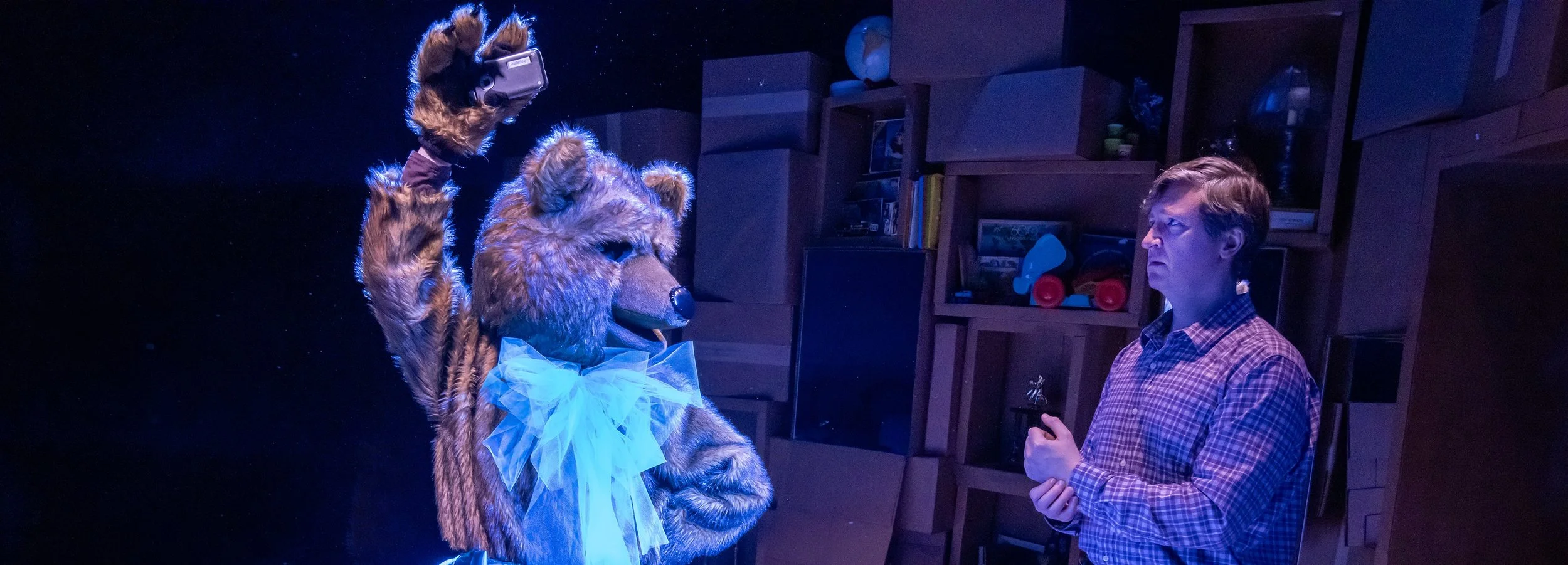Jasminn Johnson (left) and Cary Donaldson try to learn to tango from a dance teacher played by Blair Baker (right).
Fans of David Letterman may recall when he used to send a costumed staffer out into the New York streets for stunts like “Can a Guy in a Bear Suit Hail a Cab?” and “Can a Guy in a Bear Suit Get into a Strip Club?” As in those sketches, someone wearing a bear costume makes incongruous appearances during The Slow Dance by Lisi DeHaas—except this time the question is “Can a person in a bear suit liven up an emotionally and narratively deficient drama?”
Mother (Peggy J. Scott) and Son (Donaldson) have conflicting ideas about what to do with all the stuff in the house she’s vacating.
In The Slow Dance, directed by Lily Kanter Riopelle, a woman—name: Mother—is preparing to move out of her longtime home. Her son’s fiancée hires a professional organizer to help, even though Son (as the character is identified) discourages Fiancée from doing so and she has yet to meet her future mother-in-law. The personal organizer is nonbinary and is conveniently—and anomalously, in this nameless cast of characters—named Sal, like the title character of the picture book Blueberries for Sal that Mother mentions she often used to read to Son. Adult Sal always wears overalls, like the child in the book.
Is that why Mother feels so warmly toward Sal? No other reason is evident. “I don’t judge you for being whatever it was you said you were when you arrived,” Mother says to Sal (whose own mom isn’t so accepting of Sal’s gender identity); she then tells Sal that there was a man “I loved deeply before I married my husband,” and Sal doesn’t express any shock or disapproval. Both of these interactions seem like common courtesy, but apparently they’re enough for the two to bond deeply.
Characters’ motivations and attitudes are weakly construed at other points, too. Mother says she wants to get away from the home “I lived in with your father”—but he’s been gone for decades. In his forties, Son still hasn’t made peace with his father leaving when he was a child. Inexplicably, he has resented Mother all these years for it, and now that his dad has died, he’s mad at her for that. Why Son had no contact with his father after his parents divorced is never made clear.
And that’s where the bear comes in. It wanders onstage at different times, in different attire, visible only to Son—ham-handed symbolism for what he lost with his father, or maybe a reminder of the good times they had, or a coping mechanism that Son developed. What the bear ultimately represents to the audience, though, is some welcome amusement in the midst of a lifeless story.
Mother finds a friend in nonbinary Sal, portrayed by Baker (right). Photographs by Richard Termine.
Son is so tense and even hostile with Fiancée, you never get any sense of romance from them. Fiancée is strong-willed and always takes charge; this is unsubtly signaled to the audience by her proposing to Son and asking, “Does he have to lead?” at their dance lesson. But no matter how bossy Fiancée is, she still seems sweet compared to the perpetual grouch she’s engaged to. You just don’t buy that she’d be attracted to this irascible man-child, and it’s not satisfactorily explained by her reminiscence that “When I first saw you, I felt safer than I’d ever felt before in my life”—which sounds like something you’d get from how a person acts, not looks. (Also, who calls their boyfriend “Big Guy”?)
About 10 minutes from the end of the play, Fiancée mentions in a casual conversation that she grew up bouncing around foster homes, until “I became an emancipated minor and got myself out of there.” So she is the one who had the truly traumatic childhood, yet she seems unaffected, and it isn’t even part of the plot.
As Fiancée, Jasminn Johnson is competent but miscast: The actress is around 30, rather than “earlier middle age” as the script states, and the age gap with fortysomething Cary Donaldson as Son makes their coupling even less believable. Donaldson doesn’t display any personality to redeem Son.
Peggy J. Scott, by contrast, is very likable as Mother. She’s also spry and healthy, which removes the emotional caretaking issues around coping with aging parents from the story. Blair Baker portrays Sal and a couple of other minor characters—all thankless roles. Lucy York makes a fun and graceful bear, regardless of the silliness of her task.
While waiting throughout The Slow Dance for something more interesting and relatable to happen, the audience can at least enjoy looking at Ant Ma’s excellent scenic design, depicting stacks of cartons and all the stuff—like photo albums, souvenirs, record albums, old toys—that would accumulate in a house over the years.
The Slow Dance runs through March 23 at 59E59 Theaters. Evening performances are at 7:30 p.m. Tuesday through Saturday; matinees at 2:30 p.m. Saturday and Sunday. For tickets and more information, visit 59e59.org.
Playwright: Lisi DeHaas
Director: Lily Kanter Riopelle
Sets: Yi-Hsuan (Ant) Ma
Costumes: Phu’o’ng Nguyễn
Lighting: Paige Seber
Sound: Bailey Trierweiler/UptownWorks





